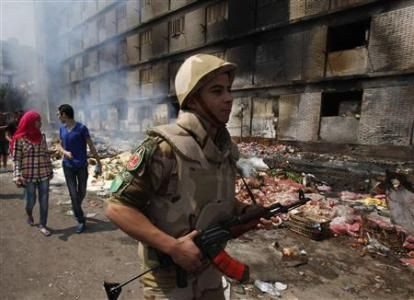Death Toll In Egypt Rises To 640 As Morsi's Muslim Brotherhood Calls For Nationwide 'March Of Anger'

Enraged supporters of ousted President Mohamed Morsi burned buildings and held protests on Thursday and Friday in Egypt, where the death toll had climbed to at least 640 people nationwide, various news outlets reported.
As Egypt continued to spiral out of control, the deeply divided nation braced for even more violent upheaval after Morsi's Muslim Brotherhood called for a nationwide "march of anger" by millions of supporters on Friday after noon prayers.
"Despite the pain and sorrow over the loss of our martyrs, the latest coup makers' crime has increased our determination to end them," said the Brotherhood, which had accused the military of staging a coup when it ousted Morsi about six weeks ago.
Prior to the announcemenet about the march, Egypt's military-backed government had threatened to shoot at those who attacked authorities and public institutions, the news service noted.
President Obama condemned the bloodshed on each side of the conflict and canceled a joint military operation scheduled for September, while calls for suspension of European economic aid were made, according to several reports.
Most of the deaths occurred when security forces clamped down on two pro-Morsi sit-in camps in Cairo, according to USA Today. In the capital's Nasr City district, 288 people were killed. The country's Health Ministry said 3,994 people were injured.
After authorities descended upon the camps and the streets of Egypt erupted into battle zones, USA Today reported. According to Interior Minister Mohammed Ibrahim, government buildings and police stations were attacked, roads were blocked off and Christian churches were set on fire.
But the Egyptian government defended its action on Thursday.
"The security agencies were keen to adopt a gradual plan to avoid bloodshed and falling of victims," a State Information Service statement said.
"Meanwhile, those who were in the two sit-ins started shooting at the police forces," the statement continued.
On Thursday, protesters set fire to a two-story villa and a four-story administrative building housing the local government, each in Giza, the administrative territory on the outskirts of Cairo where one of the two protest camps, not to mention the country's massive ancient pyramids, are situated.
In turn, the Interior Ministry authorized police to use deadly force, and the government said it would respond to "terrorist actions and sabotage" that it blamed on Morsi's Muslim Brotherhood.
During a funeral in Cairo Thursday, relatives and colleagues of policemen killed during Wednesday's violent clashes carried coffins covered with flags, the Wall Street Journal reported.
Even after all this bloodshed and turmoil, there were really no signs that government authorities had managed to place a secure hold on the country, according to WSJ.com. For instance, seven Egyptian soldiers were shot dead by unknown gunmen near the city of al Arish in the Sinai region, security forces reported.
According to the New York Times, the assault by Egyptian security forces turned out to be much more lethal than what the the interim government that replaced Morsi had initially expected.
The newspaper pointed out that ferocious actions taken by the military were, by far, the most violent of the three bloody suppressions that have occurred ever since Morsi, Egypt’s first freely elected president, was plucked from power by authorites six weeks ago -- a removal that caused Egypt to descend into its worst crisis since the ouster of Morsi's predecessor, the authoritarian Hosni Mubarak, in the revolution of 2011.
Even as the death toll climbed into the hundreds, dedicated Morsi supporters urged comrades to hit the streets on Thursday and Friday, which would defy the state of emergency imposed by the government, the Times wrote.
The New York Times added that police raided the famous Al-Eman Mosque in Cairo’s Nasr City, which had been converted into a makeshift morgue to where more than 200 bodies were brought. At the mosque, in a particuarly disturbing incident, tear gas was fired at mourners searching for relatives, according to Islamist activists. In a statement, the Freedom and Justice Party, the political party of Morsi and the Muslim Brotherhood, said police had demanded that mourners “get out of the mosque one by one and to surrender,” according to the Times.
Ahram Online, which is the Web site of Egypt’s official newspaper, reported that about 30 churches in Egypt were “completely devastated” in reprisal attacks by furious Islamists enraged over the mass killings.
© Copyright IBTimes 2024. All rights reserved.




















